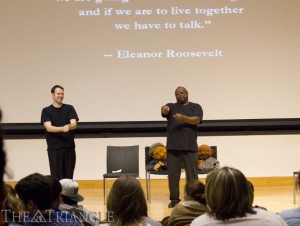The traveling sketch “The Black Jew Dialogues” attracted a crowd of about 40 students Oct. 21 to Mitchell Auditorium. The comedy duo Ron Jones and Andy Schlosberg preached the importance of cultural and ethnic diversity through various skits, jokes and dialogues.
“Be prepared for some more colorful language that’s maybe not part of your everyday vocabulary,” Schlosberg said as the show began.
“No! That’s the point!” Jones argued. “It is part of your everyday speaking. And the only way to deal with [these hurtful words are] to talk about [them].”
The two men imitated two mothers from different cultures, initially very weary of one another, bonding over cooking and taking care of their families. As well, they dressed in costume for a bar mitzvah to discuss and discover the Jewish and the black vantage points on becoming a man.
These skits outlined the show’s general message: Most people are wholly ignorant of what really goes on within the cultures and ethnicities to which they do not belong. And why is this? According to Jones, it is because humans stereotype.
“It’s the human shorthand for trying to simplify the world,” he said. There are those within the groups who fit their respective stereotypes. For instance, there are frugal Jews, and there are low-wage Hispanic workers, but one shouldn’t judge people wholly on their religion or ethnicity.
The duo used the example of the typical black stereotype — saying that they are ignorant; violent; wildly athletic; and driven by their sexual urges. Jones and Schlosberg acted out these generalizations using props. Schlosberg was placed in a dunce hat and an Afro and given a basketball and a plastic squirt gun.
“Now, now,” Jones joked as he placed a toy gun in Schlosberg’s hand, “point the gun at the nice white people.”
This skit was representative of how, if one person fits one characteristic of a stereotype, all the other characteristics associated with that group are forced upon the person. Jones claimed that the dominant groups victimized the minority.
“The dominant group establishes a narrative about who you are,” he said, although he made sure to emphasize that these narratives are hardly ever completely right.
Jones said that it is impossible to judge any one person through the lens of a stereotype. It is important to talk to people who are different from oneself. People can’t let fear inhibit interaction with others.
Jones, along with his co-creator and original Jewish partner, Larry Jay Tish, first came up with the idea for The Black Jew Dialogues after Sept. 11, 2001.
“There was just an ugly narrative after 9/11, like, ‘If not for these people, the world would be a better place,’” he said.
The two men were horrified by the idea that most Muslims were now stereotyped as terrorists, although it had just been an extreme group that was behind the plane hijackings. Jones summarized that stereotyping was a way to point fingers, to simplify things, even a way to be funny, but it was not a way to solve problems.
They explained that it is important to talk to those around you regardless of your initial impression of them.
After the two-hour skit, students were asked to share personal experiences with racism and stereotyping in an interactive discussion. The discussions included not just experiences with black and Jewish stereotypes but also those with Hispanics, gays and lesbians, Muslims, Christians, and more social and ethnic minorities. Invited to voice their opinions on the treatment and rash judgment of these groups, students voiced their personal concerns.


